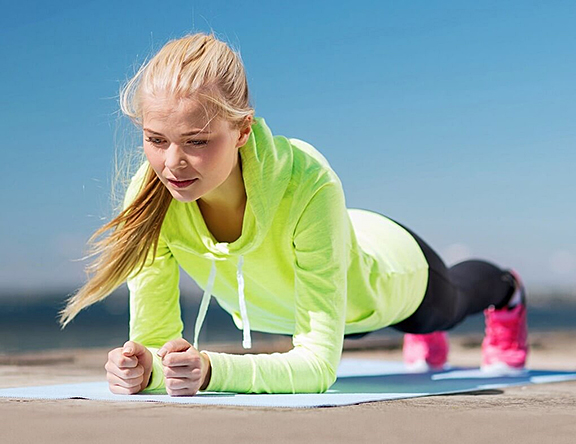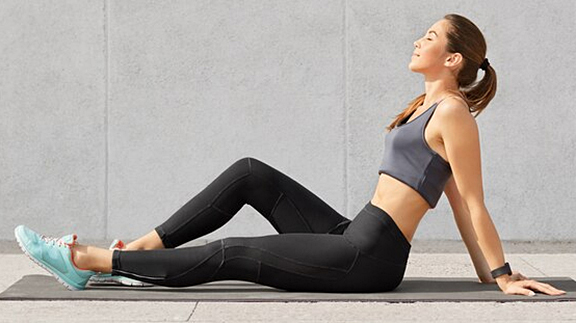Reap the Physical and Mental Rewards of Excercise
All of my family and friends know that I am a dedicated distance runner. I’ve been running since I was 15, and playing sports since I was three. Sports are a central piece of my life.
There are so many reasons I love running, including the physical and mental benefits that consistent exercise provides.
But sports don’t have to be your number one passion in order for them to benefit you. Several studies have linked exercise to improved health and happiness. There are so many reasons to add even just 30 minutes of exercise to your day.
 1. Strengthen your body
1. Strengthen your body
Exercising regularly will help increase the strength of your muscles and bones. Exercising breaks down the fibers that make up your muscles; after you train, those muscles repair themselves by fusing together the damaged fibers, increasing their size and strength.
Putting weight on your body will increase the amount of calcium that your body deposits in your bones. This makes your bones denser, and therefore stronger. An added benefit is that you’re less likely to get bone diseases like osteoporosis.
It’s important to note that it’s possible to overdo it. If you work too hard or do too much exercise at once, you can injure your muscles and bones. But having a regular routine of exercise while also incorporating recovery like stretching and fueling your body will allow you to get the most out of your workout.
Great exercises to increase muscle and bone strength include weight lifting, core exercises, stair climbing, and low-impact aerobic exercises such as going on an elliptical.
2. Reduce risk of disease
Strengthening your muscles will decrease the risk of pulling or straining a muscle while doing everyday activities. If your work environment requires physical activity, exercising outside of work can help your body handle your workload better without risking an injury. Or if you love taking bike tours when traveling, training more regularly will help you enjoy those moments without worrying about pulling a muscle.
Increasing the load your bones and joints can handle will also decrease your chances of developing osteoporosis and delay the onset of arthritis by slowing bone loss – and even helping to build new bone. Strong muscles also protect your joints.
Exercise also has great benefits for your immune system. When you exercise, your heart rate increases, pumping more blood to the rest of your body. That blood contains white blood cells, which are part of the immune system protecting your body from illness. The more these cells move around your body and deposit white blood cells, the stronger your immune system gets. Additionally, the heightened production of these cells can last for up to three hours after you’re done exercising, offering lasting protection from sickness.
Adding some cardio to your routine also reduces your risk of heart disease. When doing cardio, like running or biking, your muscles work harder to pull oxygen from your blood cells. This reduces the strain on your heart because it doesn’t need to pump as much blood to your muscles. The more consistently you train, the more efficient your muscles become – and the stronger your heart gets.
3. Improve brain function
Our brains are in constant need of many different nutrients in order to function. One of the main components it requires is oxygen. Similar to muscles, the brain receives an increased amount of oxygen when our heart rate increases during exercise. This uptick in the oxygen the brain receives gives it an extra boost.
Exercising regularly is also linked to improvements in memory. It can increase the production of chemicals that affect the growth of blood vessels and new brain cells. This increases the overall size and function of the brain, including the hippocampus, the part of the brain responsible for memory. Many studies have shown that people who exercise regularly have better memory skills than those who don’t, also significantly reducing the risk of developing Alzheimer’s and dementia.
4. Reduce stress
One of my favorite things about running is that it’s a fantastic stress reliever. If I’m having a bad day, going on a run with my friends can turn my day around.
When you work out, your body will release endorphins, or chemicals that increase feelings of well-being. Having these feel-good chemicals in your system will help you to better manage stress and decrease your risk of depression. (With winter fast approaching, what better time to stave off seasonal depression?)
And, overall, exercising can give you a break from any stressful events that may be happening in your day. If you’re having a tough day or feeling anxious, exercise can offer you some time to focus on self care.
How to start exercising
Getting into a routine of exercising can be difficult at first. If you have a lot on your plate already, even adding 30 minutes of exercise to your busy day can be overwhelming. But it doesn’t have to be.
Start small. If your goal is to work out for 30 minutes a day, maybe start with 15 minutes every other day and work your way up to 15 every day, then 20 every day, then 30. If you start off with less and build your way up to your goal, it’ll be less scary to take that first step.
Having someone else to train with also makes it more fun. Start working out with a friend; find a weekly spin class to attend together, or plan a time to meet for a run every other morning. You’ll feel more motivated and be held accountable when someone else is doing it with you – and it’ll be more enjoyable.
And the yearly tradition of New Year’s resolutions is right around the corner, so there’s no better time to resolve to start working out. Maybe get a gym membership, or take out a pair of sneakers and go on a walk. Make it your resolution to improve your physical and mental health in the New Year.
And remember that it should – and can – be fun. I love running, but you don’t have to; if you try running and hate it, try something else. It’ll be much harder to get into a regular routine of exercising if you don’t like the exercise you’re doing. Find something you enjoy and do that. Exercise looks different for everyone, but if you enjoy it and it’s good for your body and mind, you can’t lose.












